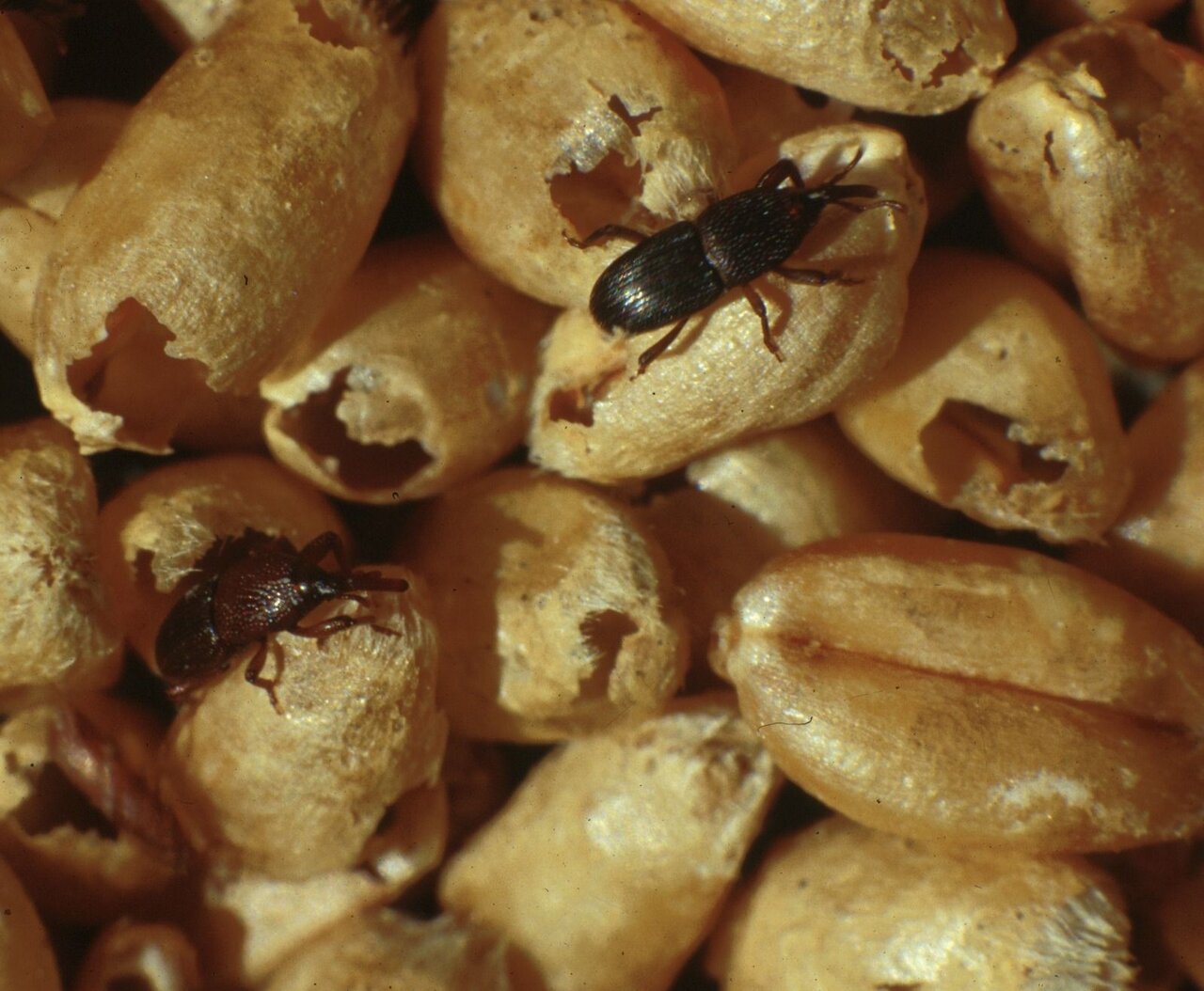Project
Preventing stored product pests in Germany

Climate-optimised storage technology for bulk grains and early detection of established and newly emerging insects harmful to stocks in the field and storage due to climate changes to reduce post-harvest losses and plant protection products
We develop optimised storage structures that combine product-specific advantages of underground hermetic storage and aspects of sustainability. The optimised early detection of insects that damage storage is also a topic.
Background and Objective
Due to climate change, the environment for the growth of arthropods that are harmful to food supplies is improving in Germany. They survive the mild winters and infestation of agricultural products is already becoming more frequent in the field. At present, little information is available on the occurrence of storage pests.
The storage structures currently used in Germany allow insect pests access to the stored goods, which results in the use of plant protection products and losses of stored agricultural products.
The aim of AVoiD is to develop optimised under- and above-ground storage structures that can also be equipped with solar cooling if necessary. In doing so, we would like to achieve the following:
- Reduction of post-harvest losses as the annual mean temperature rises.
- Reduction of greenhouse gas emissions through reduction of perishable stocks
- Reduction of pesticide application in stock protection
- Evaluation of pest resistance and cooling performance in hermetic storage
- Determination of the most economically, ecologically and socially sustainable storage technology for bulk grain goods
- Early detection of changing pest fauna due to climate change and of infestations in the field
- Determination of dispersal paths and mechanisms of insects harmful to stocks (e.g. along river courses and/or motorways from south to north with wind, active flight, or predominantly passively via transport)
Target Group
Our findings are relevant to both research and practice and should support future policy advice.
Approach
Under the leadership of the Julius Kühn Institute, a consortium of research and practice partners is working on the aforementioned issues.
Data and Methods
The occurrence of post-harvest losses due to pest infestation can be reduced by a number of measures: After thorough cleaning and drying before storage, gas-tight (hermetic) storage can make odour-oriented immigration of storage pests from the environment more difficult during storage. In addition, gas-tightness creates a low-oxygen atmosphere in the stored goods after some time due to respiration of atmospheric oxygen,
which preserves grain quality and germination capacity but suppresses the occurrence of harmful arthropods and fungi.
In the first work package, selected storage forms are therefore compared and optimised. To this end, the various project partner organisations are carrying out an economic impact assessment, monitoring of grain quality (sensory, microbiological, technical quality) during the storage process, a life cycle assessment and an evaluation of social criteria for the various scenarios.
Due to our expertise, the preparation of the sustainability assessment of the different storage variants lies with us at the Thünen Institute. In doing so, we will collect our own data, but also incorporate the findings of our project partner organisations into our assessment.
In the second part of the project, the Institute for Ecological Chemistry, Plant Analysis and Stored Product Protection (JKI) is developing optimised early detection methods for insects harmful to stocks inside and especially outside stores. This is to be tested at selected locations in Germany.
Our Research Questions
What are the advantages and disadvantages of different existing storage structures in terms of stored goods and sustainability (economic, ecological and social) and how can they be improved?
Which storage pests exist in Germany and how can they be controlled as effectively as possible?
Preliminary Results
The results of the individual work steps are combined into recommendations for the design and operation of sustainable storage structures in Germany. They should be able to be built and operated in a way that conserves resources, minimises losses of the stored goods, guarantees their quality over longer periods of time, is a barrier for storage pests, is easy to operate and at the same time cost-effective.
Links and Downloads
Dr. Cornel Adler (Project coordination, JKI Institute for ecological chemistry, plant analysis and stored product protection, ÖPV, Berlin)
Dr. Benjamin Fürstenau (JKI-ÖPV, Berlin)
Dr. Christina Müller (JKI-ÖPV, Berlin)
Camilla Albrecht (JKI-ÖPV, Berlin)
MSc. Jovanka Saltzmann (JKI Institute for strategies and technology assessment, SF, Kleinmachnow)
Julia Büchner (JKI-SF, Kleinmachnow)
Dr. Jens Begemann (MRI Department of Safety and Quality of Cereals, Detmold)
AVoiD is funded by the Federal Ministry of Food and Agriculture as part of the German Climate Protection Programme 2022. Here you can find all connected projects.
Thünen-Contact

Involved Thünen-Partners
Involved external Thünen-Partners
- Julius Kühn-Institut - Bundesforschungsinstitut für Kulturpflanzen (JKI)
(Quedlinburg, Braunschweig, Groß Lüsewitz, Kleinmachnow, Deutschland) - Max Rubner-Institut, Bundesforschungsinstitut für Ernährung und Lebensmittel (MRI)
(Karlsruhe, Hamburg, Deutschland)
Funding Body
-
Federal Ministry of Food und Agriculture (BMEL)
(national, öffentlich)

![[Translate to English:] [Translate to English:]](/media/_processed_/3/e/csm_AdobeStock_249730128_92f14d3a63.jpeg)
![[Translate to English:] [Translate to English:]](/media/_processed_/3/e/csm_AdobeStock_249730128_a6fcf4c893.jpeg)




